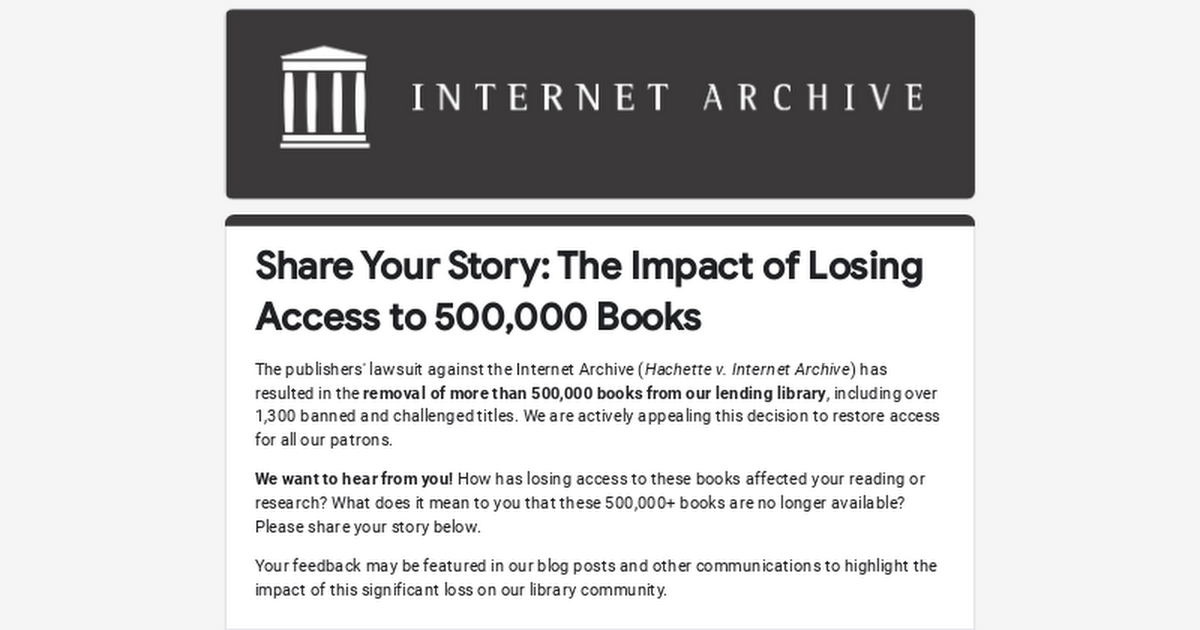It would help if we knew even just a smidgin of what these titles are.
How many are republishings? Just curious
There’s absolutely a good number of duplicates among the list they shared.
The bigger implication is of the 4 publishers in this lawsuit, 3 of them are in The Big Five publishers, who hold rights to the vast majority of books (60-80-ish % of English language books) from this century and probably a good chunk of the last one. If they win, this is the tip of the iceberg.
More like IP of the iceberg unfortunately.older books should be made available and not hidden behind licenses and unavailability because of greed
I largely agree. I don’t know the best solution for copyright. On one hand, I don’t think that necessarily the creators’ kids deserve rights forever. They didn’t make the stuff. But on the other hand, who does get the money after the creators are gone? The publisher in this case should get something for publishing physical materials or for marketing their wares that sell, but again, they didn’t create it so someone should get something.
I do think that if nobody does anything with a work for x amount of time (maybe 10 years) then it should be fair game for anyone that does.
Even things like old games, if I download a Contra NES ROM, how am I hurting Nintendo or Konami?
If I download LotR, how am I ripping off Tolkien? I’m not stealing a hard copy. I could borrow it from a physical library. Why can’t I borrow it from an electronic library? The person that deserves the rights to the literal story is dead. He doesn’t care.
As time goes on, we should be simplifying laws, not creating more. The reductionist view is that content should be freely available as long as the IP isn’t being developed/marketed still. And in order to prevent practices like Disney’s vaulting we need a developed IP rotation of every X years to prevent IP hoarding. At it’s root copyright law is rooted in greed, after you are done with the initial release, it just becomes part of everyone’s culture.
I’d like to see a world more like that, but it feels like something that would require a society much different than the one we currently have.
Even your simplified mention of freeing IP not being marketed, in the Internet age, does having an item listed as for sale but out of stock or for an unreasonable price counted as being marketed? It’s technically advertised for sale at no real cost, and can be done so in perpetuity. Or they could sell themselves product to show legal sales.
Simple rules and judgement operating under the intentof the law makes sense to rational individuals like us, but with scammy business and individuals, that’s why we end up with a complex legal system. If we hate when legal loopholes are taken advantage of, we can’t outright hate when laws get more complex.
Why does that matter?
To determine the impact of losing access to them.
Would a compromise be to simply archive them but not make them freely availible until they enter public domain.
For more current book; if they are out of print then they can be made availbe for limited loan, like any other digital library. If a digital copy is avalible for purchase from the original publisher/author, than its not fair game. Unless they come to an agreement, perhaps add supported for freely accessing a book otherwise available for purchase.
If they got rid of the download option, it would make it much more difficult to just use a DRM stripping tool (a friend told me about these terrible pirating tools, I certently don’t know how to use then). A lot of digital libraies have a dedicated app that you can only view content from. Utilize whatever anti-screen capture systems banks and Netflix use to protect from simply taking screen shots. Make is easier to access the books legitimatly than it is to pirate them.
Lastly, don’t just make everything freely availible next time there’s a world crisis.
Please inform yourself. In these comments and on their website, it is covered that they do not provide books freely. Just like any other library books can be borrowed exactly as many times as they own a copy.
Just like any other library they sometimes provide a download for Adobe Digital Edition, which manages your lends on books. But as your friend with DRM stripping tools for sure can confirm: DRM is just an annoyance for legitimate customers, it forces legitimate users to use specific applications, while pirates get the freedom to choose how they interact with the not any more protected media. But this is a discussion for another thread as archive.org treats copyrighted books just like any other library.
No, they don’t.
Other libraries don’t make unauthorized copies. The “fair use” argument is laughably weak and was rejected by the court because the law is pretty clear that it’s not legal.
Pretty hostile reply
Yes, I told someone to inform themselves before making assumptions. Which, I think, is a reasonable expectation.
The rest of the comment was pointing out how archive.org acts like any other public library and therefore should not be treated differently. This does not carry hostility against the person I am replying to.
When I want to pirate books I go to Library Genesis for that so this doesn’t impact me.
What would impact me is if IA loses enough of these lawsuits that the Wayback Machine goes offline. So maybe stop poking the bear, IA?
Perhaps you only care about the wayback machine, but there’s more to the Internet Archive than that, and they shouldn’t be expected to roll over and take it whenever some awful company decides to do a bit of digital book burning.
The linked article is specifically asking what impacts me. I am responding by explaining what impacts me.
Yes, IA has more than just the Wayback Machine. I’m not sure what your point is though. All of that is threatened by these lawsuits. Maybe if preserving that data is important IA should focus on preserving that data. Giving out unlimited copies to everyone is an unrelated secondary goal to preserving archives, so if a big company with a strong legal case comes along and says “stop giving out unlimited copies or we’ll destroy you” then maybe stop giving out unlimited copies.
That’s not “digital book burning.” The opposite, in fact. It’s acting to preserve digital books.





